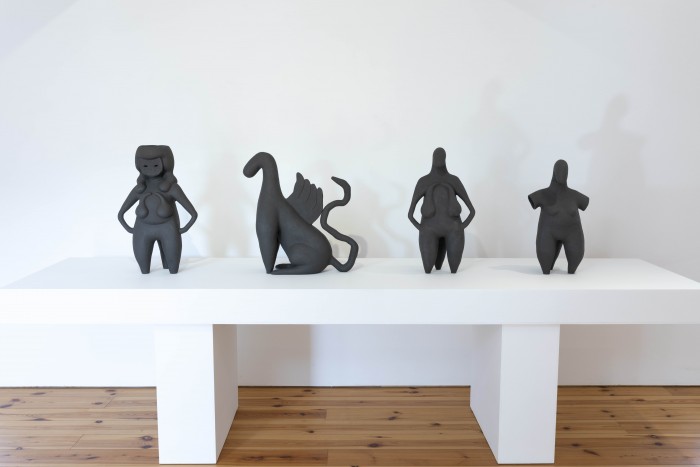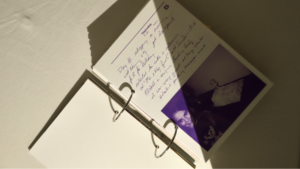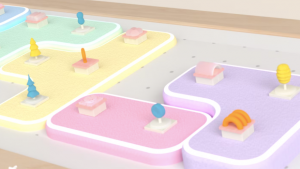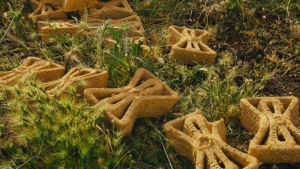Titled ‘Effigies and Elginisms’, Renee So’s first solo presentation of work in Scotland includes sculpture, stoneware, ceramics, and textiles that draw inspiration from ancient female figurines and items looted from Beijing by French and British troops.
The title of the exhibition is a description of the works in the show: effigies, which are sculptures or representations of people, and elginisms, the taking of cultural treasures from one country to another. So was particularly inspired by artifacts in imperial capitals that have been taken from countries in an act of cultural vandalism, an act that is named after two different Lord Elgins, who stole artifacts from Athens and China respectively.
The exhibition also explores So’s Chinese heritage with her study of items looted by the eighth Lord Elgin from the Old Summer Palace in Beijing during the Second Opium War in 1860. Some of the works in the show are representations of the looted objects, such as a four-legged bronze vessel belonging to the Emperor, a snuff bottle and a scholar's rock.
In keeping with So’s tradition of exploring the female figure, the artworks of ‘Effigies and Elginisms’ also examine the representation of the female form across cultures and histories. “I guess it's the changing ideals of the female form during different times which is fascinating,” she explains. “The early Venus figures are very heavyset with exaggerated curves. How a female body can change shape when pregnant and give birth is pretty amazing.”
So has always been drawn to ceramics, which she explains are part of her general fascination with the role pottery played in prehistoric cultures, “I am drawn to prehistoric cultures because they were the pioneers of pottery and ceramics. It interests me greatly that various cultures across the world all developed their own distinct pottery traditions and styles independently of each other. It feels very universal and human, and it influences my work because the history of pottery is very long and varied and I feel like I am connected to it. I also think a lot of ancient pottery looks very modern,” she says.
Born in Hong Kong and raised in Australia, So completed her fine art degree from the Royal Melbourne Institute of Technology in 1997, whereafter she explored the duality of her heritage through chinoiserie exports. She began working on her famous knitted portraits inspired by cartoon figures, medieval tapestries, and ancient friezes after moving to London in 2005.
More recently, as in ‘Effigies and Elginisms’, So put down her knitting needles and explored more ceramic sculpting and pojagi, which is a Korean quilting technique that involves hand stitching. “I like working with materials which are marginalised in the art world, I don't think there should be any hierarchy between art and craft,” says So of her choice of materials for the show. “I like making things with my hands, so I have always gravitated towards ceramics and textiles for their tactility. Furniture is great because it combines a sculptural form with textiles, and then you can sit on it!”
A short text written by Jennifer Higgie, the Australian novelist, accompanies‘Effigies and Elginisms’: “In her sculptures, tiles, paintings and textiles, borders dissolve, animals and objects merge with humans: logic is upended in a dreamlike affinity. So – whose own story traverses the globe, from Hong Kong to Melbourne and London – is fascinated by history but less by its victories than its distortions and lies, its thefts, its vagaries and its strange wonders. Hers is an art of transformation – across time and space.”
‘Effigies and Elginisms’ will take place between 2 April and 19 June 2022 at the CAMPLE LINE arts organisation in Dumfriesshire, Scotland.
Read more
Travel, exploration and wonder.
Talking African art repatriation with curator and anthropologist Meskerem Assegued.
Paying homage to the matriarchy.
Credits: Mike Bolam










